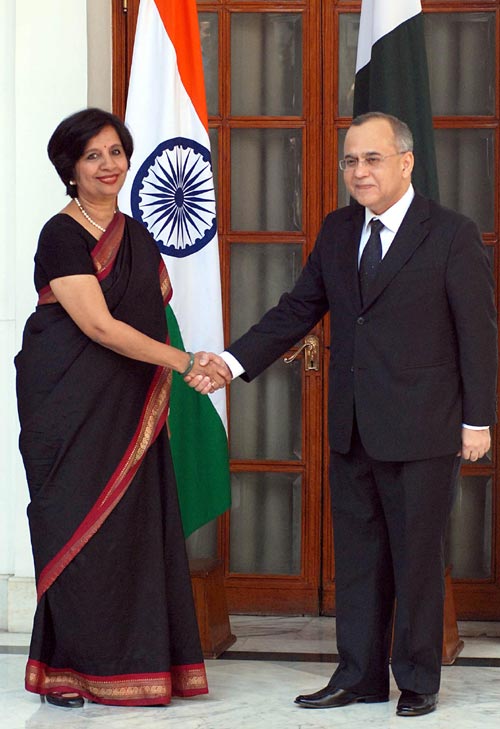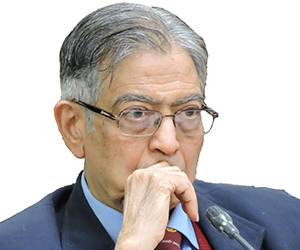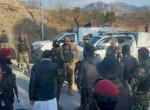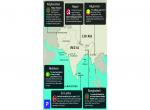In making an assessment of the India-Pakistan foreign secretary level talks held on February 25th 2010 three points must, at the very outset, be noted.
Firstly, that in seeking these talks Government has reneged on its assurances: initially, that such talks would be held only if Pakistan brings to book the perpetrators of the Mumbai attacks, and later that these talks would only be restricted to terrorism. This will encourage the Pakistani establishment to continue to engage in terrorist activities against India as it will serve to fortify its belief that India is a soft state unprepared to consider adopting hard options against it. The targeting of Indians in Kabul yesterday--- barely a day after the foreign secretary level talks--- by Taliban militants, who often act in cahoots with Pakistan, is proof of this.
Secondly, the foreign secretary level talks were sought by us under US pressure in order to promote their Afghanistan agenda, much in the manner that we delinked terrorism from dialogue with Pakistan in the Sharm El Sheikh joint statement, on the eve of Hilary Clinton’s visit to India. This cannot but impinge adversely on our autonomy and is reflective of the extent to which our foreign policy is being outsourced to Washington.
Thirdly, these talks were convened in teeth of considerable opposition in the country and certainly without a national consensus. It is a sad commentary on the Government that it is prepared to talk to Pakistan, but not to the Opposition even in order to build a consensus on an issue of critical national importance!!!
During the foreign secretary level talks, as expected, our concerns on terrorism were “spelt out forthrightly”. In this context, it is commendable that we gave the Pakistani side three dossiers, including one on Ilyas Kashmiri, and reportedly sought the handing over of a number of Pakistanis for involvement in terrorism in India, including two serving Pakistani officers namely Majors Samir Ali and Iqbal. Nevertheless, the fact remains that the Pakistani side also spelt out its concerns most notably with reference to Kashmir, Baluchistan and the Indus waters. Accordingly, the talks were, in fact, broad based or composite, as is the nature of foreign secretary level talks, and were not confined to terrorism as earlier projected by government. Indeed, the Pakistan foreign secretary used his visit to advance his country’s Kashmir agenda by meeting the Hurriyat leaders while in New Delhi.
It is notable that while our foreign secretary waxed eloquent about the “good chemistry” between the two delegations, that both sides “gained benefit” from the meeting and that the discussions were “useful”, the Pakistan foreign secretary refrained from making any such effusive comments. Indeed, in his press conference he was positively acerbic asserting that Pakistan had “done everything” it could on 26/11, that India’s charges on Hafiz Saeed were “more of literature than evidence”, that nothing more could be done against the JuD, that India should “stop lecturing” to it on terrorism and that it was not desperate for talks. In short, he made it crystal clear that India could expect no satisfaction whatsoever on cessation in Pakistan’s involvement in terrorism directed against India.
The incongruity in perceptions about the talks of the two foreign secretaries is reflective either of our naiveté or of the extent to which we are prepared to go to create an illusion of progress achieved in the talks. To suggest, therefore, as done by our foreign secretary, that the talks constitute a “first step” towards rebuilding trust between the two countries is totally off the mark.
Both foreign secretaries were quite correct in suggesting that there was a “trust deficit” between the two countries. This was amply borne out by the differences on perceptions of the quality of the exchanges and of the manner in which issues like Kashmir was addressed, with our foreign secretary stating that the latter was touched upon “briefly” and her Pakistani counterpart asserting that it was discussed at length. This was, above all, underlined by the fact that the two sides were not prepared to bring out a joint communiqué or even address a joint press conference. Such a trust deficit will not be eradicated as long as Pakistan continues to use terrorism as an instrument of foreign policy against India. It is this which condemns any dialogue with Pakistan to failure.
Regrettably, the Indian leadership appears determined to continue this exercise in futility as borne out by the foreign secretary’s indication that she and her counterpart would remain in touch and “explore ways and means to take our dialogue forward.” In a similar vein our External Affairs Minister, in a suo moto statement in both Houses of Parliament on February 26, asserted that government was convinced that the door for dialogue with Pakistan “must not” be shut. Given our obvious eagerness to reach out to Pakistan, it is clear that the stage is being set for an India-Pakistan PM level meeting at the upcoming SAARC summit in Bhutan in April 2010. This is corroborated by the fact that the back channel between the two countries, on Musharraf’s four point proposal on Kashmir under the charge of Satinder Lambah and Riaz Mohammad Khan, has also reportedly been activated simultaneously with the foreign secretary level talks.
In view of the foregoing, and government’s propinquity to act under US pressure, even on issues of critical import, without developing a national consensus and without keeping the nation informed, it is imperative that the public keep government’s moves vis a vis Pakistan under scrutiny. Just as public opinion had forced the government to backtrack from the ill advised Sharm El Sheikh joint statement, it may become necessary for it to raise its voice against the government’s endeavours to proceed with business as usual with Pakistan despite the latter’s refusal to shut down the infrastructure of terror.

- In this context, the following two points need to be underlined:
- Dialogue is not, as projected by government, the only option vis a vis Pakistan. Indeed, it is counterproductive to pursue this option as it has led Pakistan to believe that it can use terrorism with impunity against India in order to achieve its foreign policy ends. In these circumstances, India needs to engage in out of the box thinking and do, what it has never done so far, namely use all its considerable leverages, short of war, to penalize Pakistan for its resort to the use of terrorism.
- The Musharraf four point proposal so close to the government’s heart, including ideas like the demilitarization of Jammu and Kashmir, joint control mechanisms etc, is a recipe for disaster, as it will inevitably dilute India’s sovereignty over it. Moreover, it makes a mockery of the Parliament’s February 1994 resolution on Jammu and Kashmir calling for Pakistan’s vacation of aggression from that state.











Post new comment